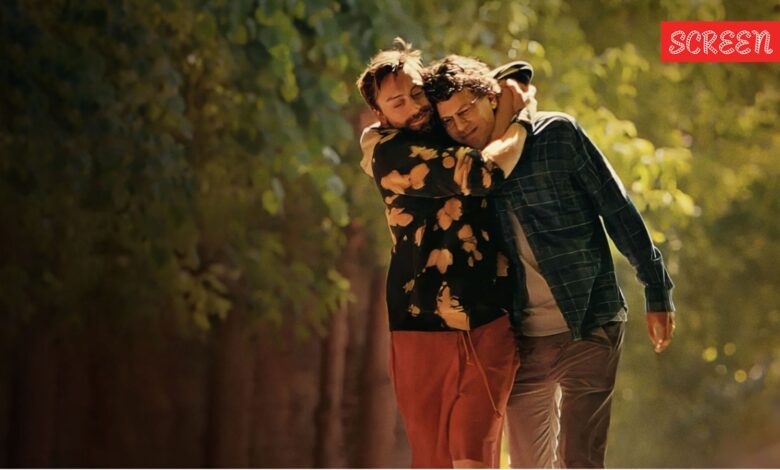‘A Real Pain’: Jesse Eisenberg’s masterclass on tackling loss, grief with humour | Hollywood News

When a child ress taking medicine, a mother may offer candy to soften the bitterness. Comedy plays a similar role in grief—it provides sweetness to help endure pain. Jesse Eisenberg’s new film A Real Pain explores this dynamic beautifully.The film follows Jewish-American cousins David and Benji, thrust into each other’s lives after the death of their grandmother. They couldn’t be more different—David, cautious and introspective, has a family, and abides the “rules of the society,” while Benji is lonely, and hides his insecurities behind irreverent humour. Their trip to Poland, meant to honour their grandmother’s memory, turns into an exploration of identity, grief, and clashing coping mechanisms—solemnity versus jest.
Their journey forces them to confront family hory and their fraught relationship. Along the way, they join a Holocaust tour group, encounter absurd and poignant moments, and navigate the challenges of understanding a past that’s deeply personal and universally impactful.
Story continues below this ad
In one of the scenes, the tour group arrives at a museum-like place with statues of Warsaw fighters who sacrificed their lives during the uprising. The Warsaw Uprising is not something remembered with a smile—it’s a sombre memory steeped in tragedy and loss. But when the film reaches this solemn point, humour steps in, offering a unique perspective to navigate the weight of hory.
A still from the movie ‘A Real Pain’
Kieran Culkin’s character, Benji, asks another member of the tour group, Eloge (Kurt Egyiawan), to take a photo of him with his cousin David (Jesse Eisenberg) posing with the statues. “Sorry, what?” David responds, clearly uneasy. “We should pose with the guys. It’ll be hysterical,” Benji replies with his trademark irreverence. David refuses, calling it disrespectful. Undeterred, Benji invites Eloge, saying, “You gonna enl?” Eloge, reluctant but amused, replies, “I’m not a fighter, Benji,” only for Benji to retort, “You can be a medic or something; these people need help.” What begins as absurdity transforms into a comedic reprieve when Eloge, smiling, concedes, “This is so silly.”
Silly, zany, and even irreverent comedy become coping mechanisms in A Real Pain. Humour, in this context, doesn’t trivialise pain; it makes it bearable.
Why humour is needed in subject-heavy films
However, this balancing act is not unique to A Real Pain. Films like Jojo Rabbit have also employed humour to reframe narratives of horical trauma. Taika Waititi’s Oscar-winning film tells the story of a young boy in Nazi Germany whose imaginary friend is a bumbling version of Adolf Hitler. The absurdity of the premise could have been offensive, but instead, it disarms the audience. Humanising the protagon’s naivete allows viewers to see the war through his innocent, conflicted eyes.Story continues below this ad
In both the films, comedy acts as a bridge between the past and the present. These films take heavy, often retold subjects like World War II and the Holocaust and present them in ways that feel fresh and accessible. This isn’t about making light of the tragedies but rather about finding a new language to engage with them. As critic Roger Ebert once said, “Movies are the most powerful empathy machine in all the arts.” Humour enhances that empathy involving audiences who might otherwise shy away from such sombre topics.
In A Real Pain, jocularity serves to invite new audiences into the conversation. It’s not that the topic has been done to death—stories of human resilience and tragedy during these times will always need retelling—but presenting it on a lighter note ensures the stories remain relatable and compelling. For a younger audience, who may not have a direct connection to these events, comedy becomes an entry point to understanding the profound.
Benji
Portrayed with remarkable nuance Culkin, Benji is the heart of A Real Pain’s humour. He is always joking around, doing everything he can to lighten the mood for those around him. He exudes a relentless desire to make people laugh, as if his sole purpose is to ensure no one feels the weight of silence or sadness. But as the story unfolds, it’s revealed that beneath his playful facade lies untold struggles –– losing his grandmother, feeling dant from his cousin, loneliness, and even an attempt to take his life, months before the events of the film.
Kieran Culkin’s character Benji in ‘A Real Pain’
This revelation recontextualises his persona, transforming it from simple comedic relief into something far more layered. Benji’s relentless joking is no longer just about making others happy; it’s about protecting himself from the darkness that constantly threatens to consume him. His humour becomes his armour, a way to keep the world at a dance and avoid confronting his own pain.Story continues below this ad
The real-life role of humour in grief
Outside of cinema, sarcasm and wit are universal coping mechanisms. Think of the awkward jokes cracked at funerals, the dark humour shared first responders, or the memes people create and share during crises. These moments of levity aren’t about dismissing grief; they’re about finding a way to endure it.
This idea is beautifully captured in another scene from A Real Pain, where David and Benji find themselves in the middle of a chaotic situation after missing a train. In their quest to find a solution to it, they go through a mini adventure that changes the mood of the situation. The scene is a reminder that even in desperation, there’s room for joy.
A lesson in healingStory continues below this ad
In A Real Pain, humour doesn’t replace mourning; it complements it. The film shows that laughter and tears are not opposites but two sides of the same coin. leaning into humour, Eisenberg doesn’t diminish the weight of the story; he makes it more relatable.
For audiences, the takeaway is clear: grief may be inevitable, but laughter is the gift that makes it survivable. In a world often overwhelmed pain, A Real Pain reminds us that sometimes it’s okay to laugh through the tears.




